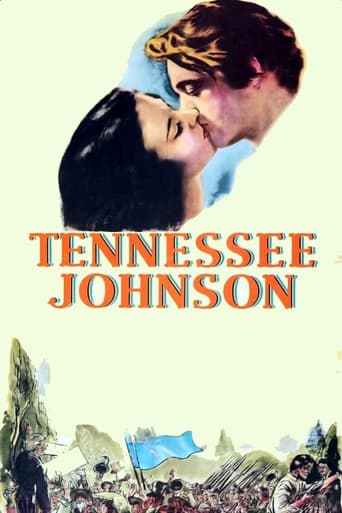MartinHafer
It is very interesting how history actually changes over time. In other words, the same people and incidents can be seen VERY differently depending on when they are discussed in history books or portrayed on film. During the 1910s-40s, the Confederacy and Andrew Johnson were seen in a much more favorable light than they are today. Back in 1942, he was seen, generally, as an able president who was persecuted by Congress. In 1866 and today, he was seen mostly as a tactless obstructionist who did everything he could to prevent blacks from receiving their rights as citizens. Because of this, I doubt if you'll seen any sort of favorable film about the man for the foreseeable future.So on to the film. The production values are very nice--with fine acting and direction--just as you'd expect from MGM. Much of the film was NOT about Johnson's presidency--and this portion it generally got right. His wife did teach his to read and write and his path from local office to the Presidency was generally on target. However, when it came to his presidency, it only once made a comment about Johnson's ill-temper. For the most part, he's shown as a reasonable man who is besieged by an evil Congress. This is far from the case--as I mentioned above. And, Thaddeus Stevens and his friends were mostly caricatures of evil--which is also incorrect. Likewise, Johnson never actually addressed the Senate during his impeachment proceedings--this is pure fiction. Bkoganbing from Buffalo hit it on the head with his review as to the many inaccuracies of the film.What you're left with is a film that is entertainment but just wrong in too many cases to be taken seriously.
wes-connors
"The Senate of the United States, in 1868, sat as a High Court in judgment upon Andrew Johnson, who succeeded Abraham Lincoln as President. In the only great State trial in our history, President Johnson was charged with violation of a law which forbade him to dismiss a member of his Cabinet. In 1926, the Supreme Court pronounced this law unconstitutional - as Johnson had contended it was. The form of our medium compels certain dramatic liberties, but the principal facts of Johnson's own life are based on history. In the Spring of 1830 - in a Tennessee valley - our story begins," states the disclaiming prologue...There, we meet film subject Van Heflin (as Andrew "Andy" Johnson), in a leg iron. The future President is a runaway apprentice (between free-man and slave, but significantly closer to free). Bound to a tailor, Mr. Heflin has learned the profession and goes about mending figurative fences with local townsfolk. He learns to read and write from attractive Ruth Hussey (as Eliza McCardle), who becomes Heflin's first lady. Reading "The Bill of Rights" gets Heflin interested in expanding US Constitutional rights to include non-property owning "white trash" like himself...Becoming successful in politics, Heflin's Johnson goes against the Southern grain by supporting some of Abraham Lincoln's platform; they both want to keep the Union whole. After the Civil War, President Lincoln selects Johnson as his Vice-President to help heal war wounds and assist in Reconstruction. Johnson has problems after succession to the top office. Yes, there are "dramatic liberties" (lies, even) taken, as the opening states. Heflin is fine, and makes Johnson a sympathetic character. Lionel Barrymore (as Thaddeus "Tadd" Stevens) and popular "silent" film star William Farnum (as Senator Huyler) have pivotal roles.****** Tennessee Johnson (12/42) William Dieterle ~ Van Heflin, Lionel Barrymore, Ruth Hussey, William Farnum
Neil Doyle
VAN HEFLIN as Andrew Johnson and RUTH HUSSEY as his wife both give earnest performances and the screenplay, while fictionalizing certain points for dramatic license, is a good one. But, as usual, history buffs are going to nitpick the inaccuracies to the point of dismissing the film as fiction. Not true. What it does do is make anyone who watches it want to consult the history books--and that's a good thing if you want to know the whole story behind Johnson being the first president in history against whom impeachment charges were made.As his adversary in the impeachment process, LIONEL BARRYMORE delivers another one of his more restrained performances without overdoing the ham. He and Heflin share some pretty dramatically effective moments, both of them in fine form. Heflin takes the character of Johnson from his humble beginnings as a tailor to his marriage to Hussey and his gradual emergence as a spokesmen for the people of Tennessee. For the sake of running time, it skips most of the years leading up to the Civil War and Lincoln's assassination, compressing all of those events and managing to keep the screenplay a tightly knit focus on the impeachment process itself. Only quibble is it fails to make clear the strongest point of the impeachment.VAN HEFLIN plays most of his role in appropriate age make-up (as does Hussey) and they're both terrific. In lesser roles, MARJORIE MAIN, REGIS TOOMEY and CHARLES DINGLE provide colorful support.Summing up: May not be a complete history lesson, but it will certainly cause viewers to probe more deeply into the detailed background of historical interest. And it does serve to remind us what a fine actor Van Heflin was in a demanding role.
capitan_movie
The story of the first US president to be impeached gets the Hollywood treatment. It is superbly acted although glossed up quite a bit. Some of Johnson's flaws are exposed, but not nearly as many as are excused. Barrymore's Stevens is terrifyingly brilliant. This is an art that Hollywood used to excel at -- telling history in an interesting and mostly factual matter without the need to flaunt the director's abject cynicism.



